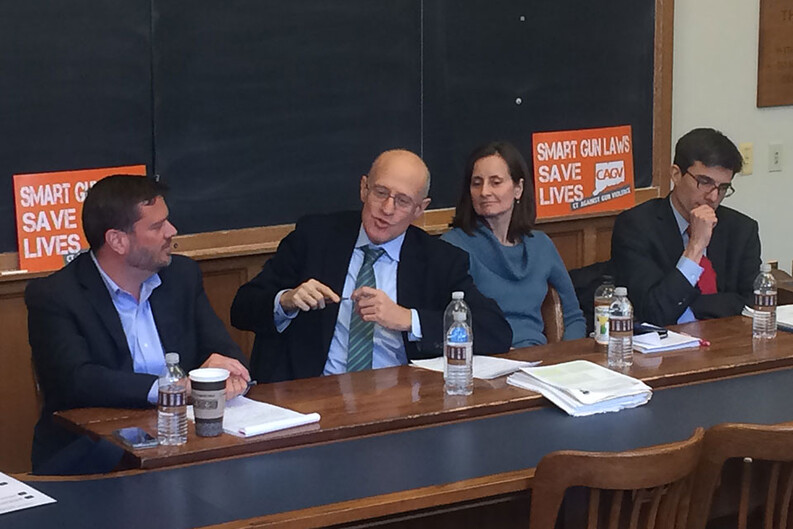Panel Held on Gun Regulation in April

The Solomon Center for Health Law and Policy at Yale Law School partnered with Yale New Haven Children’s Hospital, the Mental Health Alliance, Yale Health Law and Policy Society, and the American Constitution Society to host a panel “Regulating Guns: Can Law and Public Health Save Lives?” The discussion was moderated by William K. Townsend Professor of Law Ian Ayres ’86 and included Shannon Frattaroli, Associate Professor from Johns Hopkins Bloomberg School of Public Health; Ron Honberg, Senior Policy Advisor from the National Alliance on Mental Illness; Adam Skaggs, Chief Counsel at the Giffords Law Center to Prevent Gun Violence; and Frederick Vars ’99, Professor of Law at the University of Alabama School of Law.
Skaggs provided a brief overview of gun violence in the United States, noting that more than sixty percent of the gun deaths in the U.S. are from suicide. While the public attention in the aftermath of tragic events like the Parkland Shooting are a good catalyst for change, he continued, gun violence in urban areas and particularly in communities of color happen daily and, unfortunately, have not gotten the same amount of public outcry.
Honberg addressed the question whether improved mental health care can decrease gun violence. He discussed how people with mental illness are more often victims of gun violence than perpetrators of violence and cited work by Jeff Swanson pointing to other risk factors that are stronger indicators of violent behavior including a past history of violence, being subjected to extreme trauma and victimization, drug and alcohol abuse, and socioeconomic factors correlating to living in an area prone to violence. He acknowledged that these factors coupled with mental health issues may increase the likelihood of perpetrating gun violence. Finally, Honberg noted the pitfalls of the current federal law that prohibits the sale of firearms to anyone that has been “committed to any mental institution” or “adjudicated as mentally deficient” from purchasing firearms. He argued that language such as “adjudicated as mentally deficient” is ambiguous, stigmatizing, and may create a problematic deterrent from seeking mental health treatment.
Frattaroli, who is a nationally-recognized expert on domestic violence prevention, proposed a focus on two policies and one strategy regarding restraining orders administered through civil courts to address gun violence. She stated that half of the states’ DV restraining orders include prohibition on purchase or possession of guns by the restrained person, and there are statistically significant correlations between implementation of these prohibitions and decreases in homicide. Further, she noted that there was no concurrent increase in other DV harm, refuting claims that if guns were taken out of the hands of perpetrators they would simply manifest violent harm in other ways.
Frattaroli also discussed gun violence restraining policies or extreme risk policies that allow family members and police officers to petition the court for restraining orders and noted that a number of states including Connecticut, California, Washington, Florida, Indiana, and Oregon have adopted such laws. Finally, she proposed a strategy to support implementing provisions of protective orders and suggested that while they have been most effective in prohibiting purchase they could be better implemented to assure already possessed guns are confiscated. As a closing remark, Frattaroli said she’s optimistic about the political momentum to make progress with ideas like protective orders.
Vars focused on gun violence suicide. Vars has proposed and championed legislation that would allow people to voluntarily add themselves to “do-not-sell” lists to give people who believe that they may become a risk to themselves or others a way to put distance between themselves and firearms. He cited statistically significant reductions in gun suicide when waiting periods were implemented and, like Frattaroli, noted that there was no concurrent rise in non-firearm suicide. He described other parts of proposed legislation that would allow people to list people who they want to be notified should they subsequently request to be removed from the do-not-sell list. The intent of such provisions is to provide further opportunities for intervention to prevent self-harm.
The audience asked about the political power of the National Rifle Association and the constitutionality of voluntary registries. Vars defended the Constitutionality and said that he is still considering the implications the registry system could have for other Constitutional rights like abortion.


